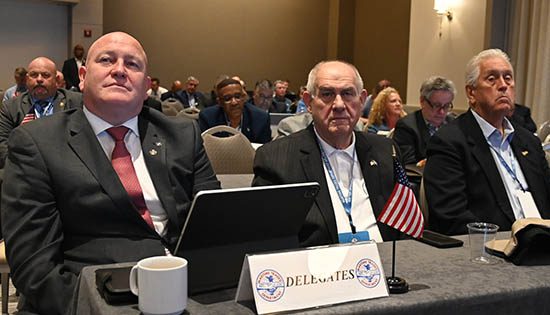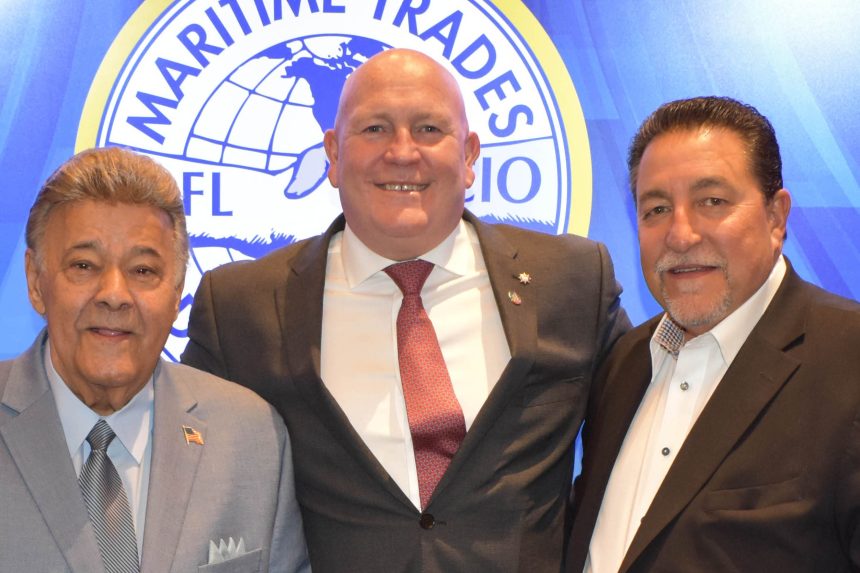
The top official of a powerful international transportation labor group said the global pandemic brought overdue, positive attention to the maritime industry.
Steve Cotton, general secretary of the International Transport Workers’ Federation (ITF), addressed the Maritime Trades Department Convention on June 10 in Philadelphia. He discussed the federation’s efforts to help workers in Ukraine; the future of transportation jobs; and the maritime industry’s response to COVID-19.
The ITF is a federation of 665 trade unions – including several MTD affiliates – representing 20 million workers in 147 countries in the seafaring, port, road, rail and aviation sectors. David Heindel, secretary-treasurer of the MTD-affiliated Seafarers Union, chairs the federation’s Seafarers’ Section.
Cotton described the situation in Ukraine as “very challenging for the global labor movement.”
He mentioned the Seafarers Union of Russia, and noted, “Those friends of a long time are still our friends, and they’re not responsible for the behavior of Putin. We’ve had to very delicately make sure our brothers and sisters in Ukraine, who are suffering terribly, are supported by the ITF and all the global union movement, and also deal with the fact that some Russian transport workers are not the devil.”
(Cotton noted the ITF’s campaign to aid workers afflicted by the war in Ukraine. Donations may be made by going to https://ukrainesolidarityfund.itfglobal.org/ .)
He then described how the pandemic, along with the unrelated grounding of a runaway-flag ship in 2021 in the Suez Canal, “highlighted to the world’s media how much they depend on the world’s seafarers. I frankly feel that we’ve been invisible. COVID has given us a unique opportunity to get into the governing bodies of the United Nations and other policymakers to remind them how critical seafarers and other transport workers are.”
Cotton said that throughout the pandemic, “we saw collaboration at the port council level to get seafarers on and off ships. Also, the world saw that seafarers are committed and professional, wherever they’re working…. In some of the worst cases, we had seafarers on ships for 18 months, with no shore leave.
“We also saw – not in the U.S. – the inability of governments to react to crisis,” he continued. “Bureaucracy made it very difficult for us to move seafarers around, and we lobbied in all of the countries. We also learned that if we want to make a significant difference, we have to be in a conversation with the shipowners, and we worked collaboratively with them. We got a message to United Nations secretary general, who agreed that seafarers should be defined as essential workers and at the top of the list when it comes to moving across borders because of the pandemic.”
Nevertheless, the crew-change crisis proved challenging, in part because of “inconsistent application of international rules.”
The ITF official then discussed the always-changing nature of work and how the United States’ freight cabotage law can play a vital role in upholding workers’ rights.
“You have the Jones Act, and the world is envious,” he said. “You have a power that goes beyond just words…. What you have in the Jones Act is something we need to transfer globally.”
Making “green jobs” union jobs is “critical,” Cotton said. “Why is it critical? Because that’s where the money is going. It’s critical that we build better jobs – better union jobs – and we in the ITF are committed to do that.”
Cotton commended Heindel’s work in trying to ensure a bright future for transportation workers while not impeding progress. He described those efforts and said they’re ongoing.
“How do we make sure that today’s seafarers have got the skills to be tomorrow’s seafarers?” he added. “We have to have a union voice in every single one of those rooms where decisions are being made.”
As a prominent example, he stated, “We need you – the strong American labor unions – and the use of the Jones Act to help us establish what is best practice when it comes to constructing windfarms off the coast. Many of our unions in traditional maritime countries don’t have the Jones Act and struggle to keep their men and women at work in the maritime sector. We think windfarms – the construction, the maintenance – could be an opportunity for good, well-paid unionized jobs for nationals all around the world.
“We’re not against change,” he added. “We understand the world will continue to develop and change. But we want a say about what it changes. We want to have a conversation about, what does digitalization look like in the ports? If we can work smarter, yeah, let’s work smarter. But let’s not put people out of work, and let’s not put people out of work without a conversation about what unions want.”
Technology can’t replace the entire workforce, he said, pointing to a recent example of another foreign-flag ship that grounded in Baltimore. The eventual freeing of that vessel showed the importance of “skilled, working men and women,” Cotton said. “Let’s not mistake that a computer is going to come along and move that Evergreen ship out of the mud. That takes real people with real skills and the ability to time-manage the challenge.”
He concluded, “Strong labor voices do make a difference, and our commitment in the ITF is unending to you.”

